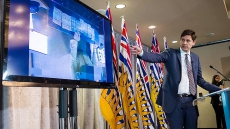HALIFAX - With economic growth projected to flatten in 2020, Nova Scotia's Liberal government is opening the spending taps to fund roads and hospitals in its fifth consecutive balanced budget.
The 2020-21 budget released Tuesday features $11.5 billion in spending with a modest surplus of $55 million and a record-setting capital plan of just over $1 billion for school building, highway twinning and hospital renovations and redevelopment.
The government is also adding $54.3 million to the Community Services Department budget, mainly aimed at increasing access to child benefits and raising the limits for housing expenses in welfare programs.
Finance Minister Karen Casey said in her budget speech that a strong economy, fueled by a rising population, means the time has come to share the province's prosperity.
"As a new decade begins Nova Scotians can be optimistic," she said.
"We have worked hard together to get the province in a position where we can provide investments and support to all of our communities and to all of our citizens."
However, her high hopes come amid projections of a major hit to the economy with the closure of the Northern Pulp mill in Pictou County. The Finance Department says the decline in forestry will deprive the province of $32 million in personal and corporate taxes this year.
Last year's economic growth, which at just under two per cent was the highest in the past decade, is projected to plummet in 2020 to 0.4 per cent.
The province is also saying it doesn't yet know what the impact of the new coronavirus may have in areas such as seafood exports to Asia.
Provincial finance officials are projecting that rising immigration and a generally healthy economy in areas such as shipbuilding and ongoing provincial capital projects will help offset the impact of the mill closure.
Still, the higher spending on infrastructure means the province has had to reverse course on reducing its debt-to-GDP ratio in the next four years.
The Liberals now foresee a gradual rise in the province's net debt, from this year's projection of $15.7 billion to $17.8 billion in three years.
The second-term Liberals are approaching the third anniversary of their current mandate, but their majority could be narrowed due to the recent resignation of a backbencher from caucus after he was charged with impaired driving, and two byelections in March.
If an election does come later this year or 2021, Premier Stephen McNeil will be able to point to a number of spending initiatives.
Recent capital spending series of announcements confirmed in the budget include $265.6 million for the purchase and construction of schools, $154.4 million to support Halifax and Cape Breton hospital redevelopments and $54.3 million for other hospitals and medical facilities across the province.
There's also $385 million for Nova Scotia's roads, highways and bridges.
Businesses are receiving a previously announced tax break, with a reduction in the corporate and small business tax at a combined cost to the province of just over $80 million.
A steady series of increases in equalization payments have helped keep the Liberal government in the black, as the revenues from Ottawa are projected to be over $2 billion in the coming year, an increase of $203 million or 10.5 per cent compared with 2019-20's budget.
The Canada Health Transfer is also up $41 million, providing $1 billion of a health budget that continues to consume almost half of the province's total revenues.
The province is benefiting from low interest rates, cutting its debt-servicing costs as long-term loans mature and it replaces them with shorter term debt at lower rates.
One exception to the province's trend to decreasing taxes is coming for smokers and people who use vaping devices, with the province saying the aim is to reduce use.
As of Sept. 15, the government will tax about 50 cents per millilitre for vaping liquids and 20 per cent of the retail value of all vaping devices, with $2.3 million in revenues in this year. The annual take is expected to be about $4.3 million.
Many typical vaping devices hold slightly less than a millilitre of fuel, meaning the tax on a package of four would total about $1.50.
There is also a two per cent tax increase on cigarettes, along with hikes in taxes on cigars and other forms of tobacco.
New spending was announced for people with disabilities, with $7.4 million to help them move from larger institutions into homes with four or fewer residents.
This comes in the wake of a high profile human rights decision ruling the province was discriminating against three people with intellectual disabilities who were forced to live in a psychiatric hospital due to the lack of smaller homes.

